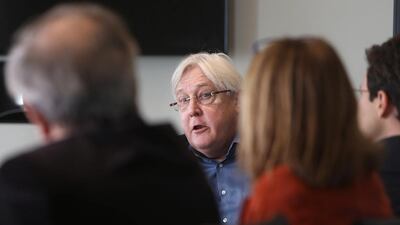ABU DHABI // International organisations need to cooperate to create a more effective and unified approach towards conflict, political experts said this week.
The topic was discussed during a book conversation with Michael Harsch, a faculty fellow of social science at NYU Abu Dhabi who analysed the relationship between Nato and the United Nations in Bosnia, Afghanistan and Kosovo.
“From Bosnia to Sudan and Afghanistan, organisations have been acting as interblocking rather than interlocking institutions,” said Harsch, author of The Power of Dependence. “Effective cooperation between Nato and the UN can make a difference in halting violence and facilitating peace.”
In 1992, only 10 per cent of all peace-keeping operations were deployed to a conflict zone where other international organisations operated simultaneously. By 2007, that figure had increased to more than 70 per cent.
“So it’s become quite busy in these conflict zones, with a lot of non-governmental organisations being around and sometimes not so much cooperating but more bumping into each other,” he said. “Since the end of the Cold War, international organisations have gained prominence in world politics and this is particularly true in international crises where states routinely rely on the UN, Nato, the World Bank and the European Union to promote political stability and economic development.”
Martin Griffiths, former deputy head of the UN Supervisory Mission in Syria, first head of the European Peace Institute and NYU Abu Dhabi’s first peace fellow, said the problem was part of a much bigger humanitarian and military issue.
“We don’t like soldiers and they don’t much like us,” he said. “Culturally, the resources that a military operation devotes to planning and implementing is extraordinarily different with that of a humanitarian one.”
He said the rift between Nato and the UN became obvious in Kosovo, the Balkan country whose Kosovo Liberation Army fought Yugoslav forces in 1998/99.
“The UN didn’t agree with Nato’s war in Kosovo,” he said. “Kofi Annan was snubbed by Nato’s decision to go to war so we began our interaction with Nato.”
Harsch said it was important that each agency not undermine the other’s actions.
“If organisations have a security task, then it is essential that both communicate and actively train and exercise together in case something happens, to be prepared for it,” he said. “That wasn’t the case in Kosovo in 2004 [when there was ethnic unrest between Kosovo Albanians and Kosovo Serbs]. There wasn’t even a permanent telephone line between the Nato commander and the UN police commander. So then you get confusion on the ground, there’s no clear division of labour and the outcome can be quite catastrophic.”
He said there was currently cooperation between the organisations in Afghanistan.
“That continues to be important in the future but then, it’ll be a question if there will be another mission where they have to cooperate,” he added. “It’s not just about states, it’s also how organisations are and how they cooperate, which adds a layer of complexity and makes certain things and actions clearer.”
He said in the past 20 years there had been more elaborate institutional cooperation between the organisations’ headquarters in New York and Brussels.
“It’s still very limited but, compared to the 1990s, it’s some sort of progress,” Harsch said. “That will hopefully ensure more communication [to allow] at least a bit of advanced planning before you go into a mission. Frequent interactions allow that. It’s still very low key and limited but going towards more institutionalised.”
cmalek@thenational.ae

